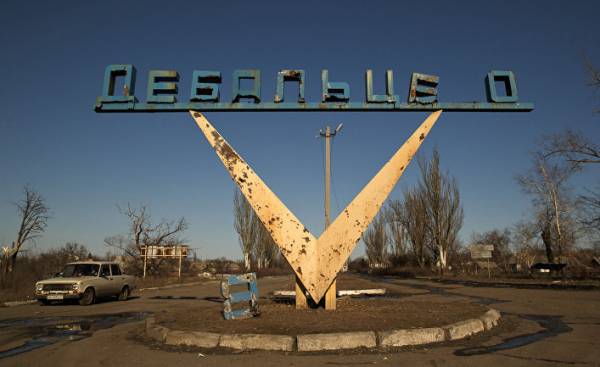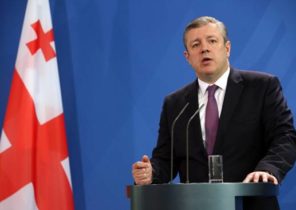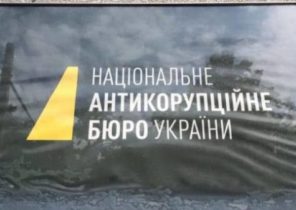
In late January — early February 2015, militants attempted to encircle the Ukrainian part, entrenched in the city of Debaltsevo in the Donetsk region. Heavy fighting ended with the retreat of divisions of VSU and national guard with the debaltsevsky base. Day February 18, 2015, when this happened, the participants of those events believe the second day of his birth.
The battle for debaltseve. As of the end of January 2015 the position of the Ukrainian army in the area debaltseve was a large ledge, hitting rebel positions between Gorlovka and the administrative border with the Luhansk region. It was defended by 4.7 thousand servicemen of the armed forces and about 500 soldiers of the national guard of the interior Ministry (first number of Ukrainian group is estimated at 2.5 thousand fighters). They were opposed from 10 to 19 thousand fighters who launched air defense systems and combat formations saturated with electronic warfare systems.
The figure of more than 10 thousand fighters was made in a special video prepared by the General staff of the APU debaltsevskogo to the anniversary events. About 19 thousand said the former chief of staff of the ATO major-General Alexander Cerski. But in any case the preponderance was on the side of the enemy. Thus, according to the General staff of the Ukrainian grouping in the area of Debalcevo had 120 tanks, 180 artillery systems and 65 units of reactive systems of volley fire (MLRS). The second side had 170 tanks, 290 110 pieces of artillery and MLRS units. In the opinion of the General staff, the enemy planned to encircle Ukrainian forces in the debaltseve area, to divide the forces of ATO in the sector “C” into two parts and to leave the borders of the Kharkiv region. The military defeat of the Ukrainian army allowed to demand that the Ukrainian government a significant political concessions.
The attack on the beachhead, according to the General staff, began on the night of January 30, 2015, when the rebels managed to occupy the Central part of Uglegorsk. The counterattack, launched 31 January, two battalion tactical groups of the 30th separate mechanized brigade of the armed forces together with the National guard, without success due to lack of power. According to Alexander Mirskogo, the operation came down to actually unblocking the soldiers of company MIA “Svityaz” and artillery anti-tank battery, who took the defense of the city. In the end, the rebels occupied the commanding heights near Uglegorsk.
The advance of the enemy on the opposite side of the ledge from the area of Redkodub-Nikishin, also have developed more or less successfully, despite the opposition of the Ukrainian troops. Finally, on 9 February, the militants have occupied the village Logvinova, blocking the so-called road of life, the route M-103 which was supplied Ukrainian troops defending debaltseve. An attempt to recapture Logvinovo failed. At the request of the General staff of VSU, it happened due to the fact that the units that were to attack the village from the East, refused to complete the task. Faced with the superior forces of the enemy, advancing in Line, the group was forced to withdraw. Since then the Ukrainian military in debaltseve was in the operational environment — the condition in which to the limit in a more complicated supply of troops. In early February 2015, it became clear that debaltseve Saga is nearing its end.
Position The “Cross”. In those days, two soldiers of the 8th infantry battalion of the National guard — Vitali Lazebnik (the press photographer of the newspaper “Today”) and his friend Constantine (call Major), who continues to serve in the University was defended by a post on “the Cross.” The so-called crossing routes Rostov — Kharkiv (M-103) and the Donetsk — Luhansk close to Debaltsevo. According to Major, the guards themselves wanted to take part in active combat. “We performed other tasks, but at some point started to ask the battalion commander to send us to a place where it’s hot. We went to meet him, and on 1 February we got on the “cross”, — said Konstantin.
By the time Uglegorsk was already in the hands of the enemy, but a “way of life” was still free. But in the Debaltsevo was already very restless. “We lived in the basements of urban buildings, and above all was exposed to fire from different artillery systems. Fired from mortars, Grads, self-propelled guns. The sound we learned to determine what they’re shooting at us. For example, mine gives out a nasty whistle. If you hear it, it probably means mine is flying with you, but the shorter the whistle, the closer it will fall. Cold, darkness and constant attacks — that’s what the most memorable”, — said Konstantin.
Shelling remembered Vitaly: “do You think arrivals mortar to go to the toilet. The logic is this: in the box 6 mins Between them in 30 seconds interval. And when there is a change of box, you have a minute and a half to go to the bathroom or to appear on the surface to call home.”
The soldiers tried not to tell relatives where they are: “we had a guy named Andrew. He went to talk to my wife, and then began to fly mines. The wife asks: “What’s going on?”. And he answers: “Yes, the pot then fell down and rolled on the floor”. One of our really died — not managed to hide in the bunker during the shelling. You know, during the war, gradually getting used to being around shooting here and it ruined him,” says Constantine.
Guards at “the Cross” went to investigate. In parallel, they tried to establish contact with neighbouring units, exchanging phone numbers, to establish joint activities (system of interaction between the troops then worked obscenities). According to Major, it was difficult to distinguish who oppose them — the Russians, the local militia or Cossacks. But, unfortunately, the local population is very often performed at the side of the separatists. “They adjusted the fire of artillery. There were people with Pro-Ukrainian position. Someone went with us,” Constantine said.
4 or 5 day on the positions of the guards realized that the case goes to the environment. Certain hopes were pinned on the Minsk agreements, which were to take effect from 0:00 on February 15, but in reality, the truce did not last two hours. “At 0:00 on 15 February there was a dramatic silence — remembered Vitaly. But just an hour and 20 minutes somewhere in the distance, like a mortar. And it started all over again.”
On 16 February, the enemy broke in Debaltsevo, and on February 18 in the morning began to retreat from the bridgehead. Constantine and Vitaly left from debaltseve at different times: Major ahead of his companion. “First we went on the KrAZ. Trucks one after the other broke down, but we picked up guys on the tank. Then we move on BMD, and he generally got on foot,” — said Konstantin.
First, Vitaly also was chosen by KrAZ, leaving debaltseve in the last three days. However, the convoy of three trucks, which drove Lazebnik, was ambushed. The first two trucks that were carrying the guys from another division, was shot by enemy tanks. “We missed, but the car was hit with shrapnel, and she stood up. Then we went on foot. Got out around 11 am. During the withdrawal of our battalion had no casualties,” — said Vitaly.
After completion of the fighting, the defense Ministry has estimated the losses of the Ukrainian side in 179 people, and gunmen in 868 people. A year later, the Ukrainian military losses were adjusted to 110 people, and the loss of fighters was increased to 870 people. Ukrainian command admitted the loss of 30% of the equipment, noting that the enemy had lost 200 units of its vehicles.
Since then, for both guardsmen and all those who served with them on “the cross”, February 18 was the second day of birth. They call up their mates and try to meet in order to recall the events that they had experienced. “We could all stay there, if God hadn’t decreed otherwise. But, on the other hand, we ourselves have done a lot in order to stay alive. But I don’t want our children ever got the same experience,” said the Major.







